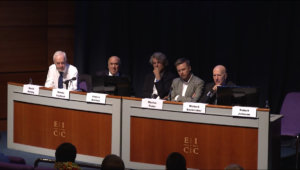QEH recognizes that economists and market participants alike face ambiguity about which quantitative model of the process driving outcomes is the correct one. Building on Frank Knight’s distinction between risk and “true uncertainty,” QEH formalizes ambiguity by opening an economic model to unforeseeable change in its coefficients. The defining feature of such change is that it cannot “by any method be [represented ex ante] with an objective, quantitatively determined probability” (Knight, 1921, p. 321).
By design, QEH models do not seek to account for quantitative regularities in time-series data. Instead, QEH proposes a way to build models that generate qualitative predictions of co-movements in these data.
Opening a model to unforeseeable change, and yet aiming to confront the model’s pre- dictions with empirical evidence, poses considerable challenges. In our presentation, we discuss how QEH proposes a way forward that might enable economists to overcome these challenges.
Regardless of whether QEH, or some other, yet-to-be invented approach, turns out to be useful in this regard, recognizing the inherent limits to what we can know about the future appears to be necessary for developing epistemologically coherent and empirically relevant macroeconomic and finance models. In this note, we provide a rigorous argument for this imperative.

